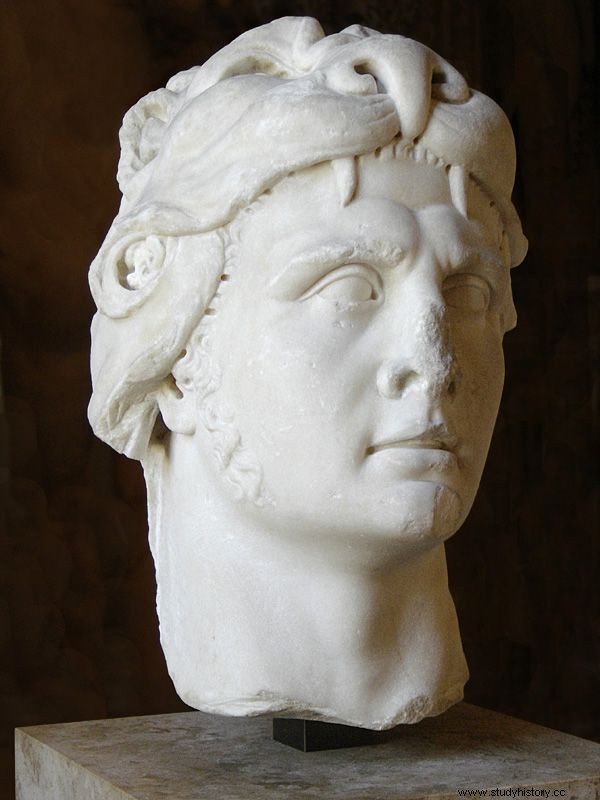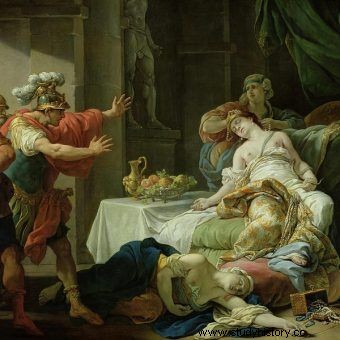Mithridates VI Eupator reigned from 120-63 BCE He knew more than twenty languages, which he learned, however, not to understand other peoples, but to read the original treatises on poisons and antidotes. The mysterious life of King Pontus is not only fascinating but also terrifying.
Named half-Hellen and half-barbarian by Anna Świderkówna, when he sat on the throne of Pontus, he immediately proclaimed himself a descendant and rightful successor of the rulers of Asia:from Cyrus to Alexander the Great.
His plan was to create a great Greek-Iranian state. Fulfilling my dream meant one thing:conflict with Rome.
For the wealth taken from Asia, Asia will take from Rome three times as much, and for slaves working on Italian soil, twenty times as many sons of sunny Italy will be slaves to Asia.

Mithridates' territorial gains look impressive to this day. In order to expand his empire, however, he did not hesitate to murder thousands of people in cold blood ...
Using the prophecy found in the Sibylian Oracles , Mithridates organized troops of war chariots equipped with spinning blades, and then gave a secret order to murder all Roman citizens in Asia Minor. With the blood of about 80,000 Romans on his hands, he soon began to panic for his own life.
Merciless killer
Oedipus anti-complex. This could be the name of the trauma caused by the plot of the mother-regent on Mithridates to remove him from power and hand over the crown to his brother. However, he managed to escape, and when he defeated his mother, he had no qualms:he ordered to poison her and the brother involved in the plot.
He had no mercy for his first wife - and sister at the same time! - Laodiki. The madness, born of fear of another plot, also led him to poison his own children:three sons and three daughters. But that's not all. The ruthless king of Pontus was also poisoning himself.
Inhuman experiments
Suffering from obsessive fears that he would be poisoned, Mithridates chose to immunize himself against all the toxins known at the time. From an early age, he ordered to administer small doses of them, and then appropriate antidotes.

In antiquity, he was depicted as Hercules, which was to symbolize the courage and bravery of King Pontus. In fact, Mithridates lived in constant fear.
In order to find a universal legendary antidote, which is a panacea for all diseases, he began toxicological tests on living people. Prisoners of war, convicts and slaves were his private guinea pigs, on which he could test the body's response to the poison and the speed of the antidote. Managed to. The royal medics obtained the mysterious mithridatum .

Death by poison was not uncommon in the ancient world ... Pictured is a painting by Louis Jean Francois I Lagrenee from 1755.
The antidote consisted of fifty-four natural ingredients dissolved in honey. These were, inter alia, blood from wild ducks feeding on poisonous aquatic plants, polemony extracts or common St. John's wort. Modern toxicologists speculate that the base of the panacea was "mad honey", produced by Pontic bees from nectar collected from the flowers of a poisonous rhododendron. The antidote proved successful. Unfortunately.
Cursed Antidote
When in 74 BCE Another Mithridates war with Rome broke out, the King of Pontus was not as lucky as the last time. After many years of fighting, he was forced by Gnaeus Pompey in 63 BCE. to commit suicide. The poison he applied to himself, however, did not work. The antidote that was the object of his life's dreams turned out to be his greatest curse. Instead of a quick death, he made himself die in agony. The great King of Pontus, who was ineptly trying to cut his sword, had to be finished off by a Gallic guardsman.

Who would have thought that one plant hides both the mystery of death and life. Honey made from the nectar collected from the rhododendron served Mithridates as a base for poison, but also as an antidote.
Other emperors, however, successfully applied Mithridates' invention. Ironically, they were the emperors of Rome, the greatest enemy of King Pontus. Nero and Marcus Aurelius have saved their skin more than once by adopting a universal panacea enriched with opium. After adding more than forty substances, the Mithridates specific was used in European medicine until the beginning of the 19th century, naming it in honor of the inventor: Electuarium Mytridatis.
